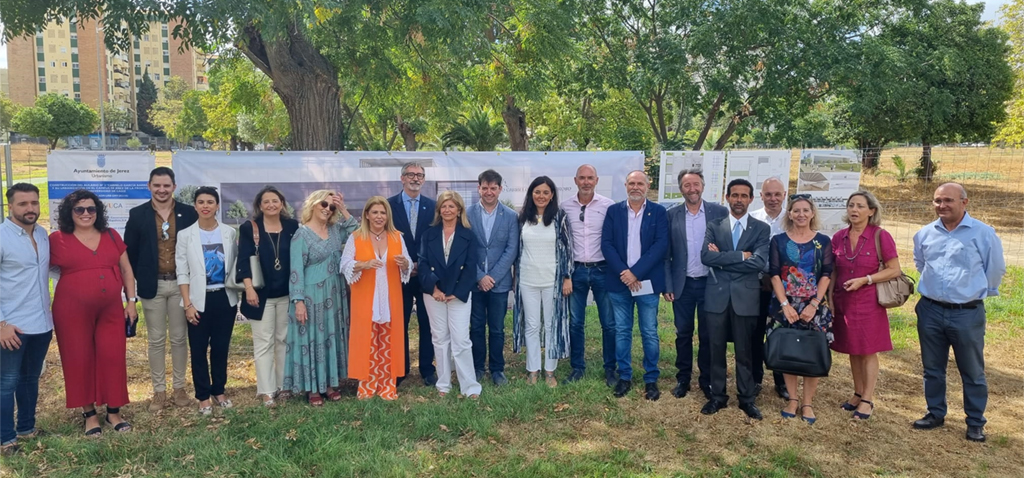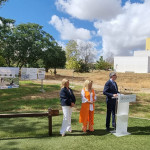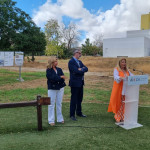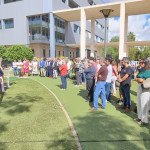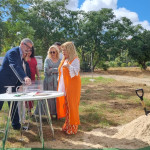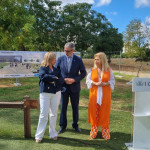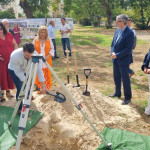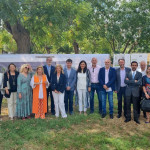The University of Cadiz begins work on the second ‘Carmelo García Barroso’ lecture hall on the Jerez Campus 14 September 2022
They will have a cost of more than 5.8 million euros, a construction period of 17 months, a built surface area of 5.800 m2, capacity for 2.100 students, 15 classrooms and an assembly hall for 400 people.
The rector of the University of Cadiz, Francisco Piniella, together with the mayoress of Jerez, Mamen Sánchez, the territorial delegate for Educational Development and Vocational Training and University, Isabel Paredes, and the vice-rector for Digitalisation and Infrastructures, Carlos Rioja, today presided over the ceremony to lay the first stone of the second lecture hall on the Jerez Campus. This new building will bear the name of Professor Carmelo García Barroso and its construction is part of the UCA’s infrastructure plan as part of a strategy to strengthen and improve the facilities on its four university campuses.
The second lecture hall at the Jerez Campus, on which work began at the beginning of September, is a historical demand of the university community in view of the increase in the number of students and the academic offer of the campus. The execution project was awarded last July (UTE Construcciones Serrot SA-Sardalla Española SA-ERYSAN 2007 SL) at a cost of 5,889,711.58 euros (+ VAT) and a minimum execution period of 17 months. With a built surface area of 5,800 m2, the building will have a capacity for simultaneous use by 2,100 students and includes a total of 15 classrooms, as well as two laboratories and an assembly hall for 400 people which, once completed, will be the largest in the UCA.
With its construction, the new lecture hall will respond to the needs of the Jerez Campus, the epicentre of studies in Legal and Communication Sciences and where a university community of more than 6,500 people, including teaching staff, students and administration and services personnel, carries out its academic and scientific activity. In this way, its growth is guaranteed, as well as the full development of the teaching and activities of its diverse academic offer, consisting of nine undergraduate degrees, five double degrees, ten official master’s degrees and four doctoral programmes.
According to the rector of the UCA, with this second lecture theatre, “we are taking a significant step towards further consolidating Jerez as a university city, improving and increasing the modern and functional university infrastructures of the UCA’s Jerez Campus. Since its inauguration in 2004,” he pointed out, “this Campus has not stopped growing for a single academic year. 18 years, 18 courses later, it continues to do so. A coming of age that we are inaugurating with the start of this work. It is obvious that the facilities built for its creation and start-up, efficiently used and maintained, have required permanent updating and improvement, a kind of resetting every year and an intention to expand”.
In this context, Francisco Piniella recalled that “the current governing team of the UCA is involved in a strategy to improve the university infrastructures of our four campuses. A plan for the coming years that included as a priority the construction of the second lecture hall on the Jerez Campus and which, he said, we are undertaking with our own resources, optimising them to the maximum, attending to the needs of the centres and campuses and prioritising the most necessary actions”.
The rector of the UCA stressed that “it has not been easy to tender a project of this magnitude in a pandemic and in times of war, with an upward projection of the costs of materials that has forced us to a second tender”. For this reason, he wished to thank “the quiet and rigorous work carried out in recent months by the Vice-Rectorate for Digitalisation and Infrastructures from its Directorate General for Infrastructures. This determined work has been supported at all times by different areas and services of the UCA: Management, Contracting, legal services, the Rector’s delegation for the Jerez Campus, etc. She also thanked “all the institutions that, from the very beginning, have felt allied to this ambitious and necessary project: the Jerez City Council and the Andalusian Regional Government, especially”.
The mayoress of Jerez thanked the rector and his team “because you have fulfilled the commitment to build this second lecture hall, which will be a revulsive and which bears the name of Carmelo García Barroso. This lecture hall will make it everlasting”. Mamen Sánchez emphasised that both institutions are committed to strengthening all their relations, so that “the campus will not remain alone in this space, that the doors of knowledge will be opened to its citizens and that it will be an increasingly permeable, participative and active collaboration”. It was necessary to be aware that “Jerez is a university city, more than 6,000 people converge here every day and that its university should be more present in the decision making process of this city with a fluid relationship and its participation in many of its forums”.
For her part, the territorial delegate for Educational Development and Vocational Training and University of the Junta de Andalucía has praised the University for “this well-deserved gesture with Carmelo”. Likewise, Isabel Paredes thanked the UCA for this new infrastructure, where “there will be many meeting points to continue growing in this Campus and in the university. I am fully prepared to actively listen to all sectors”.
The project for the new lecture hall, whose design was awarded to Planho Consultores, includes an important set of facilities for the Jerez Campus of the UCA that reinforce the existing ones. Thus, it includes a large classroom (220 seats), seven medium-sized classrooms (between 100 and 125 seats), five seminar rooms with 75 seats, two computer rooms with 48 seats, five seminar rooms (75 seats), a language laboratory (64 people) and a nursing simulation laboratory (50 seats) and an assembly hall with a capacity of 400 seats, “whose use we want to open to the public,” says the UCA rector.
All these rooms are distributed over three levels: semi-basement, ground floor and first floor. The building is designed to be fully integrated into the campus, respecting its urban structure based on orthogonal avenues and low-rise buildings. In this way, it seeks maximum integration and accessibility, especially on the ground floor, where 75% of the activity takes place. It is a building with a high occupancy rate, where the open spaces play a very important role in its organisation, as points for unexpected encounters and informal exchanges. The building meets the most demanding standards in terms of energy efficiency. Consequently, the orientation, organisation and size of the courtyards, protection of the façades and integration of vegetation in the courtyards and in the surroundings have been designed to improve energy efficiency, prioritising the reduction of consumption and the maximum use of natural resources. Its construction includes the installation of photovoltaic and solar thermal panels capable of producing 70,000 kWh/year. Conceived and designed in times of pandemic, it allows the adoption of social distancing criteria and is capable of completely renewing the air in a classroom every 6 minutes.
Inaugurated in 2004, the Jerez Campus brings together an important set of facilities (lecture hall, common services and seminar building, library, multiple services building, University Research Institute for Social and Sustainable Development and indoor and outdoor sports facilities) that make it a modern, exemplary and functional campus and a reference within the Spanish university system. Two UCA faculties are located here (Law and Social and Communication Sciences) and three other centres with teaching facilities are permanently based there (the Faculties of Nursing and Physiotherapy, Economics and Business Studies and Labour Sciences).
Currently, its academic offer is made up of the following degrees (9): Public Administration, Criminology and Security, Law, Business Management and Administration, Nursing, Marketing and Market Research, Advertising and Public Relations, Social Work and Tourism, which are completed with five double degrees. Upon completion, students can choose from among ten official master’s degrees: Law, Strategic Management and Innovation in Communication, Digital and Social Marketing Management, Tourism Management, Public Management and Administration, Lifelong Learning in Legal Consultancy for Companies, Research and Analysis of Flamenco, Legal and Social Protection of People and Vulnerable Groups, International Relations and Migration (bilingual), Criminal System and Crime and Criminal Violence. In addition, this diverse and specialised teaching activity is completed with four doctoral programmes: Law; Social, Criminological and Behavioural Sciences, Communication and Tourism.
The event was attended by the family of Professor Carmelo García Barroso, an important representation of the academic management of the Campus, with its deans and head offices, delegations from the student body and the Student Council, the Rector’s Delegation for the Jerez Campus, as well as municipal authorities and the Senate, technicians from the Vice-Rectorate for Digitalisation and Infrastructures and representatives of social and cultural groups.


